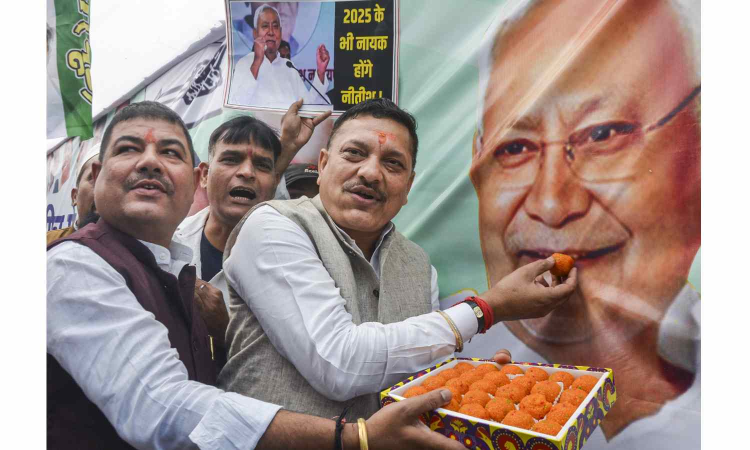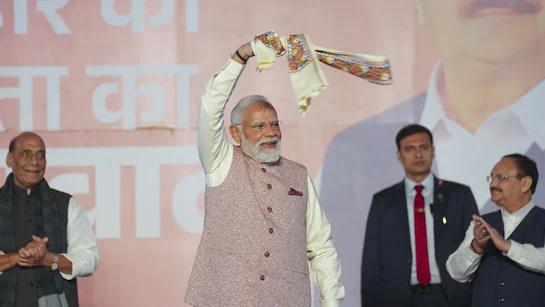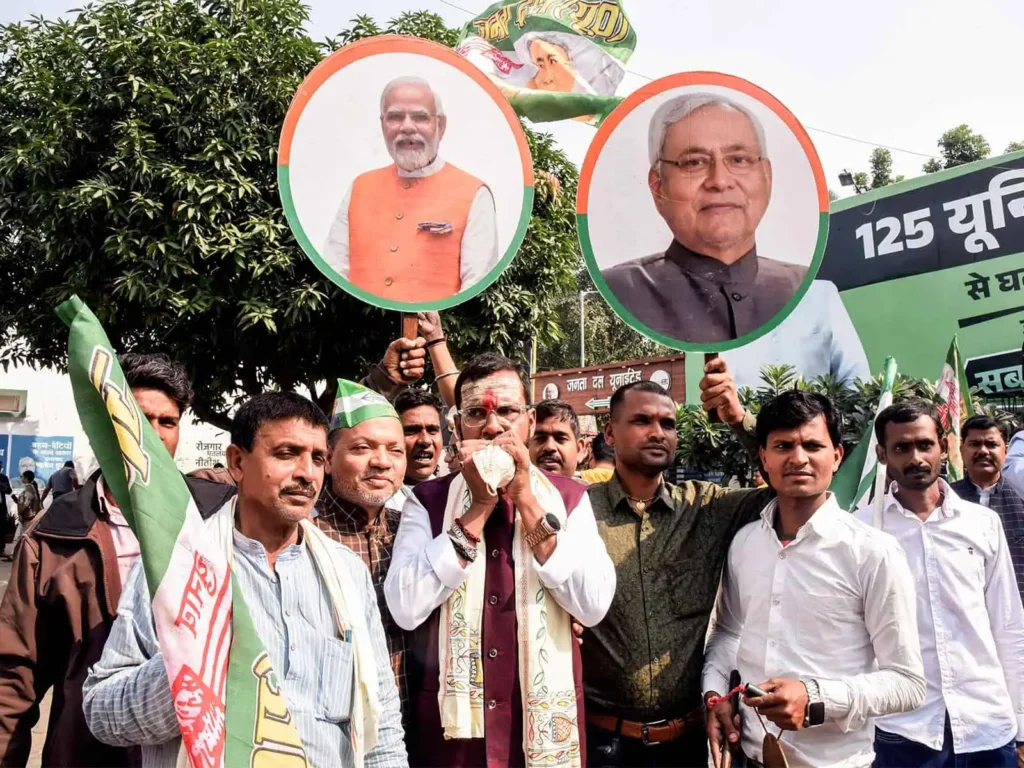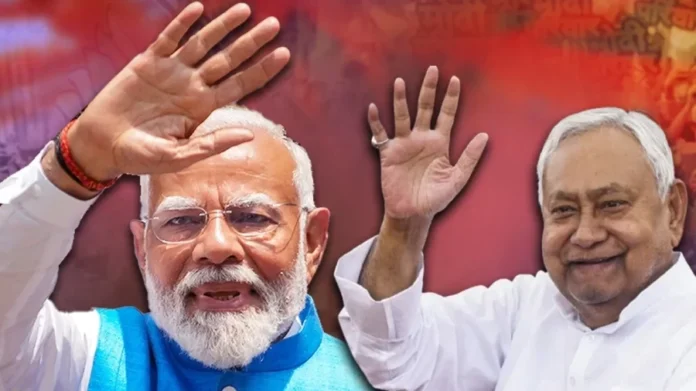The Bihar election results 2025 are out, and the verdict is loud — NDA has stormed back with 202 seats, marking a sharp comeback for Chief Minister Nitish Kumar and his JDU. The JDU won 85 seats, up from 43 last time, while BJP bagged 89 and Chirag Paswan’s LJP(R) emerged as a surprise force with 19 seats. Together, they wiped out the Mahagathbandhan, which collapsed to just 35 seats amid infighting and confusion.
So what powered this massive NDA resurgence? Here are the 10 powerful factors that shaped Bihar’s political turnaround.
Table of Contents

1. Women Voters: The Real Game-Changer
Nitish Kumar’s focus on women empowerment turned into a political jackpot.
His government directly transferred ₹10,000 each to 1.21 crore women under the Jeevika Didi scheme. This initiative — popularly known as “10-Hazariya Yojana” — became a talking point in villages across Bihar.
With 3.51 crore women voters, nearly 40% of them linked to Jeevika, this scheme alone impacted almost half of Bihar’s total electorate.
According to political strategist Amitabh Tiwari, “By empowering 1.21 crore women, the scheme indirectly influenced nearly 3.6 crore votes.”
Even Mahagathbandhan’s late attempt to woo women with a promise of ₹30,000 per year couldn’t match this real-time benefit.
2. Free Power Boost: 125 Units that Lit Up Votes
In July 2025, the state government rolled out 125 units of free electricity per month for 1.67 crore households, covering both rural and urban homes.
With an estimated five crore voters benefitting, this “free power” plan turned into an emotional vote-puller among lower-middle-class families who felt direct relief in rising living costs.
3. Pension Power: Elderly and Dependents Back the CM
Nitish Kumar’s decision to increase the old-age and widow pension from ₹400 to ₹1,100 per month proved decisive.
The scheme covered 1.11 crore people, offering both economic relief and a strong emotional connect with elderly and dependent families.
The Mahagathbandhan’s counter-promise of ₹1,500 pensions and higher increments fell flat — voters preferred “money in hand” over promises on paper.
4. Youth & New Voters: Targeted Monthly Stipend
For Bihar’s young graduates struggling for jobs, the CM launched a ₹1,000 per month unemployment allowance in September 2025.
Currently, 7.6 lakh youths are receiving this benefit, creating a tangible connect with first-time voters.
Additionally, his commitment to create one crore jobs by 2030 kept the hope narrative alive among aspirational youth.
5. Students: Loan Relief and Hope
The Student Credit Card scheme was re-energized — making loans up to ₹2 lakh completely interest-free and extending repayment periods.
With nearly 4 lakh beneficiaries, Nitish’s message to young Bihar was clear: “Study freely, your CM has your back.”
6. Caste Engineering: Coalition of Communities
NDA’s ticket distribution strategy struck the perfect social balance —
85 upper castes, 39 Dalits, 37 Kurmi-Koeri, 29 EBCs, 27 Vaishyas, 19 Yadavs, 5 Muslims, and 2 tribal candidates.
Re-aligning with Chirag Paswan (LJP-R), Upendra Kushwaha (RLM), and Jitan Ram Manjhi (HAM) reactivated Dalit, Kushwaha, and Musahar vote banks.
- Paswans (5.3%) influence ~50 seats
- Kushwahas (4.3%) dominate ~70 seats
- Musahars (3.1%) impact ~35 seats
This seamless caste synergy became the NDA’s invisible armor.
7. Development Narrative: From Airports to Temples
Development blended with symbolism in this election.
In just three months before polls, NDA showcased key projects:
- Purnea Airport (fourth in Bihar) connecting the entire Seemanchal region.
- 6-lane Cable Bridge in Begusarai linking 33 constituencies across Mithilanchal and Magadh.
- Janaki Temple at Sitamarhi’s Punaura Dham, echoing Ayodhya’s religious sentiment, gave BJP a Hindutva narrative edge.
Political analyst Manikant Thakur notes, “Like in Uttar Pradesh, the mix of faith and development resonated deeply in Bihar’s Hindu belt.”

8. PM Modi Factor: 16 Districts, 97 Seats Won
Prime Minister Narendra Modi held 16 rallies covering 122 constituencies — NDA swept 97 of them.
From Samastipur to Bettiah, the PM’s aggressive campaigning, coupled with his personal appeal, consolidated upper-caste, EBC, and youth votes.
9. Prashant Kishor’s Party Fizzles Out
Despite heavy campaigning on 240 seats, Prashant Kishor’s Jan Suraaj failed to make a dent.
All candidates trailed, proving his political experiment ineffective — a relief for NDA, which feared a vote split.
10. Mahagathbandhan Meltdown: Disunity and Delay
The opposition alliance collapsed under its own contradictions.
Seat-sharing disputes, lack of clarity on the CM face, and delayed candidate announcements created chaos.
Nine constituencies even saw RJD and Congress candidates contesting against each other, confusing voters.
The result: BJP and JDU swept all such seats.
Their grand promises — like “a job for every family,” “₹30,000 to every woman,” and “free 200 units power” — appeared unrealistic.
Voters, skeptical yet pragmatic, chose deliverables over dreams.

ByNews-View: Delivery Defeated Drama
Bihar’s 2025 verdict reaffirms a simple truth: governance that touches lives trumps grand political rhetoric. Nitish Kumar’s focus on women, welfare, and delivery revived his image as the practical CM who delivers quietly but decisively.
Chirag Paswan’s tactical entry added the missing link — emotion and caste alignment.
For now, NDA’s blend of social welfare, caste balance, and Modi-Nitish chemistry has redrawn Bihar’s political map — and perhaps, the roadmap for 2029.
Also read:

